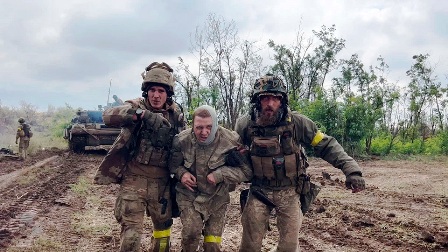


Mansky & Titarenko: Eastern Front

This film has been shown at numerous festivals and now the audience In Barcelona gets the chance to watch it and meet one of its directors, Vitaly Mansky, in the Q&A. At a session the day before, entitled “Documentary filmmaking against the backdrop of war”, Mansky will be on stage together with Alba Sotorra Clua , Barcelona based director, who has made fims like the documentary feature film Game Over (2015), which received the VIII Gaudí Award from the Catalan Film Academy and Comandante Arian (2018), nominated for the Gaudí Awards for Best Documentary in 2019.
I have seen “Eastern Front” and it is a strong documentary from the frontline at the same time as you get some impressive and positive insights to what a group of volunteer medics perform to help injured soldiers get to hospital before it is too late – often it is. Yehen Titarenko, charismatic co-director with Mansky, filmmaker, is on the screen driving the car through muddy roads OR he is with his medic friends in quiet Western Ukraine, where they go to relax and celebrate a baptism, and talk talk talk about what this war has meant and means to them. A quote from the description of Titarenko on the website of DocsBarcelona:
“On 24 February 2022, Yeyhen and his friends decide to volunteer to join the first aid battalion on the eastern front of the Ukrainian war. They are willing to provide all necessary support and evacuate the wounded. For six months, the hand-held camera follows them with showing the rawness, fear, hatred and bitterness of war with shocking proximity and without intermediaries…”
“Eastern Front” will be shown in Barcelona the 25th of May, the day before Mansky and Alba Sotorra will have the mentioned dialogue, moderated by Marc Marginedas, about documentary filmmaking in the midst of armed conflicts:
What are the challenges when filming a war or bringing real stories to the big screen against the backdrop of an armed conflict? What role does the documentary gaze play as a political positioning and what is the implication behind directing documentaries while highlighting the more human side of war? How does the filmmaker find hope in the midst of war? What filmmaking decisions do they make to show the rawness and violence, but at the same time, hope? How does one write the script/editing of a war film from a perspective, where hope prevails? When does the filmmaker realise they are in front of a great sequence in the midst of the conflict?
6 pens